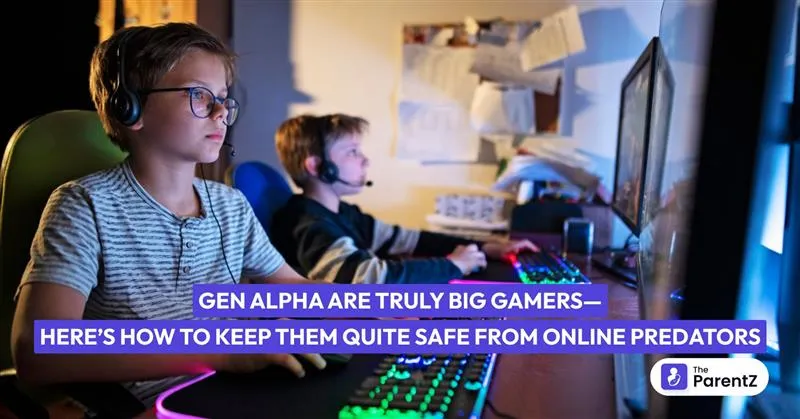Gen Alpha kids are absolutely obsessed with gaming. From the moment they wake up to when we practically have to drag them to bed, they're on Roblox, Fortnite, Minecraft, or chatting away on Discord with their gaming buddies. And honestly? Gaming isn't going anywhere. It's their social world, their playground, and how they connect with friends.
But here's the thing we need to talk about: while our kids are having fun, there are some seriously bad people out there who see gaming platforms as their hunting ground. We are not trying to scare you, but we need to face the facts and get our kids prepared.
The Reality Check We All Need
The numbers are pretty shocking. According to the FBI, as many as 500,000 predators are active online every day, targeting kids ages 12 to 15. That's not some distant threat—that's happening right now, today, while your kid is playing their favorite game.
These predators aren't just lurking in weird corners of the internet anymore. Any platform with a direct message (DM) or public chat feature can pose risks for kids. That includes Roblox, Minecraft, Fortnite, Discord, and Twitch. Basically, if your kid can chat with strangers while gaming, there's a potential risk.
How These Predators Actually Work
Here's what's scary—these people are smart about how they approach kids. They don't just show up saying creepy things right away. They're patient, they're strategic, and they know exactly how to blend in with the gaming community.
They start by being the "cool older friend" who's really good at the game. They offer to help your kid level up, give them rare items, or teach them new strategies. They build trust over weeks or even months. Sometimes their motivation was money, and other times they did it "just for power," but the end goal is always harmful.
On platforms like Roblox, predators have gotten creative with their communication. They're literally speaking in code to avoid detection.
The really concerning part? These criminals force young victims to create disturbing content, including self-harm and animal abuse. They then use this material to blackmail victims or share it within their group. Once they have something on a kid, they use it to control them.
What Parents Need to Watch For
Your kid isn't going to come to you and say, "Hey Mom, I think someone online is being weird." They often don't even realize what's happening until it's too late. Here are the warning signs you need to know:
Behavioral Changes:
- Suddenly being secretive about their gaming or quickly switching screens when you walk by
- Getting upset when they can't game or when you ask about their online friends
- Receiving gifts, money, or game items, they can't explain
- Using gaming terms or slang you've never heard before
- Staying up late "gaming" more than usual
Gaming Red Flags:
- New "friends" who only want to chat privately
- Anyone asking personal questions (real name, school, address, phone number)
- People wanting to move conversations to other apps like Snapchat or WhatsApp
- Adults who seem way too interested in your kid's life outside of gaming
- Anyone asking for photos or videos, even if they seem innocent at first
How to Actually Keep Them Safe
Okay, so we can't just ban gaming—that's not realistic and would probably make things worse. Instead, we need to be smart about how we handle this.
Start With Honest Conversations: Sit down with your kid and explain that some adults use games to find and hurt children. Don't make it scary, just factual. Tell them that real friends their age won't ask for personal information or try to meet up in real life right away.
Set Up Smart Controls: Most gaming platforms have parental controls, but they're not perfect. Turn off or limit chat features when possible. For younger kids, especially, disable private messaging entirely. It's better to deal with some complaints than deal with a predator situation.
Create Gaming Rules Together:
- Never share real names, schools, addresses, or phone numbers
- Don't accept friend requests from people they don't know in real life
- Tell you immediately if someone makes them uncomfortable
- Keep gaming devices in common areas, not bedrooms
- Take breaks from gaming to hang out with real-life friends and family
Know Their Gaming World: You don't have to become a gamer yourself, but at least understand what platforms they're using. Roblox, Fortnite, Minecraft, and Discord are the big ones right now. Each has different risks and safety features.
Monitor Without Being Creepy: Check their friends lists regularly. Ask about their online friends the same way you'd ask about school friends. If they're playing with someone new, ask how they met and what games they play together.
Teaching Kids to Protect Themselves
The goal isn't to watch your kid's every move forever; it's to teach them to recognize danger and speak up. When young people understand the importance of digital citizenship, they will be empowered to protect themselves by turning off chat, blocking messages, reporting suspicious activity online, and recognizing the signs of grooming.
Teach them that it's never their fault if an adult makes them uncomfortable online. Make sure they know they can always come to you without getting in trouble, even if they think they made a mistake.
Conclusion
Gaming isn't the enemy here; predators are. Our Gen Alpha kids are going to keep gaming whether we like it or not, so our job is to make sure they can do it safely. The key is staying involved without being overbearing, staying informed without becoming paranoid, and keeping communication open without being preachy.
These conversations might feel awkward, but they're so much better than dealing with the alternative. Our kids are smart, but they're still kids. They need us to help them navigate this digital world safely.





Be the first one to comment on this story.